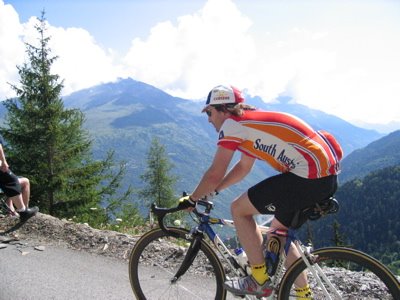EPO
Interesting that in the decade that EPO became widely available, the world 10km record for men dropped by 45 seconds. Now, this is definitely not to say that the people setting world records were taking EPO - simply that to beat someone on EPO it might have meant running a whole lot faster than before. Perhaps it has nothing to do with drugs, maybe training took a giant leap forward during this period?
Time reduction (in seconds)
1970-1980 - 16.90
1980-1990 - 14.27
1990-2000 - 45.48
2000-2005 - 05.22
But it's interesting that not only did every record in every men's event improve, they improved at a faster rate than before. This is the opposite of what you would expect - as we get closer to human potential the improvements we make should be smaller. It's also interesting that as events go from 1,500m to 5,000m to 10,000m the improvements get greater - and not just in terms of an extra second for every extra kilometer - take a look...
Pre EPO: 3:29.5 - Now: 3:26.00
Pre EPO: 12:58.0 - Now: 12:37.35
Pre EPO: 27:08.0 - Now: 26:17.53
So since the appearance of EPO, the percent change in improvements year on year has been just under 100 percent for the 1,500; a little over 100 percent for the 5,000m, and an astonishing 200 percent for the 10,000m.
Remember when great runners would set a record and it lasted for years? Henry Rono's 10,000m record stood for 6 years, Fernando Mamede's 10,000m record stood for 5 years. Since the introduction of EPO the record has fallen 10 times in 12 years. Are Nike shoes really getting that much better?
The sad thing is there might be a price to pay for the rapid improvements athletes have made since EPO emerged. The first runner to set a new world best after the introduction of EPO, Richard Chelimo, was found dead at age 29 (a side note: his record lasted just one week).
Hicham El Guerrouj 's comments on Chelimo's death make interesting reading: http://news.bbc.co.uk/sport2/hi/athletics/1499086.stm
Current 10,000m record holder Kenenisa Bekele saw his elite athlete fiance collapse and die while out on a run. Wikipedia says: "On January 4, 2005, Bekele's fiancee, 18-year-old Alem Techale, died of an apparent heart attack while on a training run with him. Although it was initially stated that no autopsy was performed, Techale and Bekele's manager, Jos Hermens, later said that an autopsy had revealed nothing conclusive about the young woman's death. She was the 2003 World Youth Champion in the 1500 m and in excellent physical condition. The mystery surrounding her death has raised suspicion about the possible use of EPO or other performance-enhancing drugs by Techale and perhaps other athletes in Hermens' care."
The "other athletes in Hermen's care" include one Haile Gebrselassie, who has set the world 10,000m record twice (along with setting many other records).
People often point to cycling as the sport with a drug problem. But a look at the "Operación Puerto" case in Spain reveals an often overlooked fact. An EPO-supplying doctor was "treating" 200 athletes. Fifty-eight of those athletes were cyclists. EPO isn't cheap - it costs over $10,000 a year to fly to Spain for regular purchases of the treatments. You need to be winning a lot of prize money to make EPO worthwhile. So that leaves over 100 athletes unaccounted for - athletes that compete in events that require sustained effort, benefit from increase oxygen-carrying capacity, and stand to earn enough money to make spending $10,000 seem like a good investment.
Thankfully, things have changed. A test for EPO has been developed - and look at the difference it has made already. In the years 1996 to 2005 16 runners broke 12.50 for 5,000m, in the same period 14 runners broke 26.50 for 10,000m. This year - an Olympic selection year - no runner has gone under 13 minutes for the 5,000m and no runner has gone under 27 minutes for 10,000m.
The Beijing Olympics might be the slowest since EPO became available - but that might also make it the fairest and safest.
Labels: Drugs in sport, EPO, marathon, running


1 Comments:
interesting thoughts, gordon!
Post a Comment
<< Home